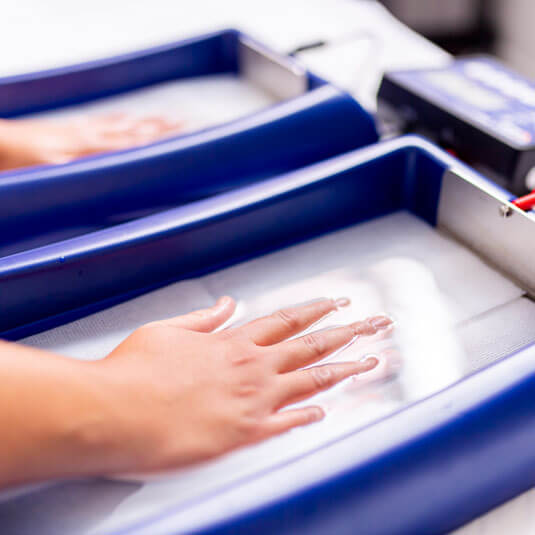Dermatology Tips and Treatments for Hyperhydrosis of Hands: Ingenious Solutions
Dermatology Tips and Treatments for Hyperhydrosis of Hands: Ingenious Solutions
Blog Article
Understanding the Origin of Excessive Sweating and Its Influence on Life
While it is generally recognized as a physical reaction to regulate body temperature level, the triggers for extreme sweating can vary commonly among people, including not only physical variables yet mental and also psychological aspects. By delving right into the root creates of hyperhidrosis and discovering its multifaceted results, a deeper understanding of this prevalent problem can be gained, losing light on the complexities that people grappling with extreme sweating navigate on an everyday basis.
Physiology of Sweat Glands
The policy of sweat manufacturing, a critical physiological procedure, is mainly regulated by the activity of sweat glands dispersed across the human body. Gland are categorized right into two primary types: eccrine and apocrine glands. Eccrine glands are the most numerous and are discovered in practically all locations of the body. They play a vital duty in thermoregulation by secreting a watery fluid onto the skin's surface area, which aids and evaporates cool down the body down. On the other hand, apocrine glands are concentrated in locations rich in hair follicles, such as the underarms and groin, and their secretions are thicker and milklike in appearance.
When the body temperature increases, either as a result of exercise, high temperatures, or psychological tension, the nerve system triggers the sweat glands to create sweat. This sweat is made up largely of water and electrolytes like salt and chloride. The procedure of sweat manufacturing is essential for maintaining the body's internal temperature within a slim, optimal range, highlighting the crucial role sweat glands play in human physiology.
Triggers for Excessive Sweating
In comprehending the root creates of extreme sweating, it is essential to recognize the triggers that can lead to this physiological reaction. Physical exertion, high temperature levels, and spicy foods are also recognized to set off excessive sweating in people prone to this problem.
Additionally, drugs such as some antidepressants, opioids, and specific supplements can also work as triggers for hyperhidrosis. Understanding these triggers is essential in handling excessive sweating successfully - How to stop sweaty hands. By recognizing and dealing with the details triggers that trigger too much sweating in a specific, doctor can develop customized therapy plans to minimize this problem and improve the individual's top quality of life
Medical Conditions Associated
Connected with too much sweating are various medical problems that can aggravate this physiological action. One typical condition is hyperhidrosis, a disorder defined by extraordinarily increased sweating that exceeds the body's thermoregulatory requirements. This can materialize in focal locations like the hands, soles, underarms, or face, impacting an individual's high quality of life as a result of social shame and pain.
Furthermore, endocrine disorders such as hyperthyroidism, diabetes mellitus, and menopausal hot flashes can also lead to too much sweating. Hyperthyroidism creates Treatment for hyperhydrosis of hands an overproduction of thyroid hormones, increasing metabolic rate and causing sweating.
Additionally, infections like consumption, endocarditis, and hiv have actually been related to night sweats, an usual symptom recognized to interrupt sleep and influence general health. These medical conditions highlight the varied series of underlying aspects that can add to too much sweating, requiring thorough examination and management by medical care professionals.
Psychological and Psychological Aspects

Effect On Social Interactions
Extreme sweating can have extensive effects on a person's ability to engage pleasantly in social interactions. The noticeable indicators of sweat stains or damp patches on clothing can result in shame and self-consciousness, causing individuals to take out from social scenarios. This withdrawal can impact connections, restriction social tasks, and hinder professional and personal development.

Additionally, the anxiousness and self-worth issues stemming from excessive sweating can impact communication and interpersonal skills. Individuals may battle to concentrate on discussions, join team tasks, or share themselves with confidence. This can lead to feelings of seclusion and isolation, as social links come to be testing to keep.
Verdict

While it is typically understood as a physical feedback to control body temperature, the triggers for excessive sweating can differ commonly among people, incorporating not only physical factors but emotional and likewise emotional components. By delving into the origin triggers of hyperhidrosis and discovering its diverse effects, a much deeper understanding of this pervasive issue can be obtained, dropping light on the complexities that people grappling with extreme sweating navigate on a day-to-day basis.
Physical effort, high temperature levels, and spicy foods are likewise known to activate excessive sweating in people susceptible to this problem. By determining and resolving the certain triggers that prompt extreme sweating in an individual, health care companies can create individualized therapy plans to reduce this condition and improve the person's top quality of life.
Extreme sweating can have extensive effects on a person's capacity to engage pleasantly in social interactions.
Report this page